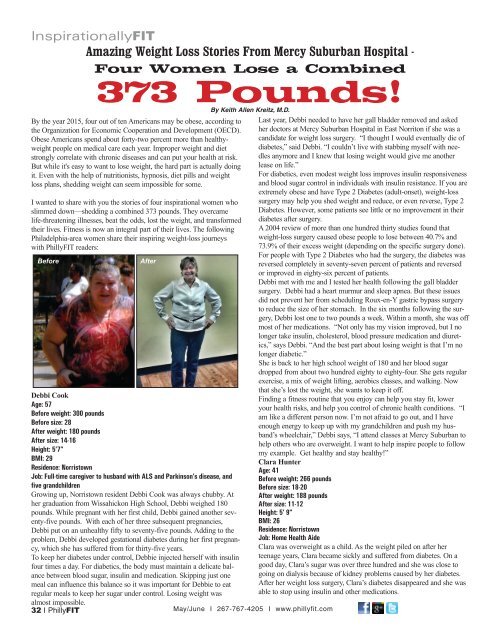⢠Running the Right Way - PhillyFIT Magazine
⢠Running the Right Way - PhillyFIT Magazine
⢠Running the Right Way - PhillyFIT Magazine
- No tags were found...
Create successful ePaper yourself
Turn your PDF publications into a flip-book with our unique Google optimized e-Paper software.
InspirationallyFITBy <strong>the</strong> year 2015, four out of ten Americans may be obese, according to<strong>the</strong> Organization for Economic Cooperation and Development (OECD).Obese Americans spend about forty-two percent more than healthyweightpeople on medical care each year. Improper weight and dietstrongly correlate with chronic diseases and can put your health at risk.But while it's easy to want to lose weight, <strong>the</strong> hard part is actually doingit. Even with <strong>the</strong> help of nutritionists, hypnosis, diet pills and weightloss plans, shedding weight can seem impossible for some.I wanted to share with you <strong>the</strong> stories of four inspirational women whoslimmed down—shedding a combined 373 pounds. They overcamelife-threatening illnesses, beat <strong>the</strong> odds, lost <strong>the</strong> weight, and transformed<strong>the</strong>ir lives. Fitness is now an integral part of <strong>the</strong>ir lives. The followingPhiladelphia-area women share <strong>the</strong>ir inspiring weight-loss journeyswith <strong>PhillyFIT</strong> readers:BeforeAmazing Weight Loss Stories From Mercy Suburban Hospital -Four Women Lose a Combined373 Pounds!By Keith Allen Kreitz, M.D.AfterDebbi CookAge: 57Before weight: 300 poundsBefore size: 28After weight: 180 poundsAfter size: 14-16Height: 5’7”BMI: 29Residence: NorristownJob: Full-time caregiver to husband with ALS and Parkinson’s disease, andfive grandchildrenGrowing up, Norristown resident Debbi Cook was always chubby. A<strong>the</strong>r graduation from Wissahickon High School, Debbi weighed 180pounds. While pregnant with her first child, Debbi gained ano<strong>the</strong>r seventy-fivepounds. With each of her three subsequent pregnancies,Debbi put on an unhealthy fifty to seventy-five pounds. Adding to <strong>the</strong>problem, Debbi developed gestational diabetes during her first pregnancy,which she has suffered from for thirty-five years.To keep her diabetes under control, Debbie injected herself with insulinfour times a day. For diabetics, <strong>the</strong> body must maintain a delicate balancebetween blood sugar, insulin and medication. Skipping just onemeal can influence this balance so it was important for Debbie to eatregular meals to keep her sugar under control. Losing weight wasalmost impossible.32 I <strong>PhillyFIT</strong>May/June I 267-767-4205 I www.phillyfit.comLast year, Debbi needed to have her gall bladder removed and askedher doctors at Mercy Suburban Hospital in East Norriton if she was acandidate for weight loss surgery. “I thought I would eventually die ofdiabetes,” said Debbi. “I couldn’t live with stabbing myself with needlesanymore and I knew that losing weight would give me ano<strong>the</strong>rlease on life.”For diabetics, even modest weight loss improves insulin responsivenessand blood sugar control in individuals with insulin resistance. If you areextremely obese and have Type 2 Diabetes (adult-onset), weight-losssurgery may help you shed weight and reduce, or even reverse, Type 2Diabetes. However, some patients see little or no improvement in <strong>the</strong>irdiabetes after surgery.A 2004 review of more than one hundred thirty studies found thatweight-loss surgery caused obese people to lose between 40.7% and73.9% of <strong>the</strong>ir excess weight (depending on <strong>the</strong> specific surgery done).For people with Type 2 Diabetes who had <strong>the</strong> surgery, <strong>the</strong> diabetes wasreversed completely in seventy-seven percent of patients and reversedor improved in eighty-six percent of patients.Debbi met with me and I tested her health following <strong>the</strong> gall bladdersurgery. Debbi had a heart murmur and sleep apnea. But <strong>the</strong>se issuesdid not prevent her from scheduling Roux-en-Y gastric bypass surgeryto reduce <strong>the</strong> size of her stomach. In <strong>the</strong> six months following <strong>the</strong> surgery,Debbi lost one to two pounds a week. Within a month, she was offmost of her medications. “Not only has my vision improved, but I nolonger take insulin, cholesterol, blood pressure medication and diuretics,”says Debbi. “And <strong>the</strong> best part about losing weight is that I’m nolonger diabetic.”She is back to her high school weight of 180 and her blood sugardropped from about two hundred eighty to eighty-four. She gets regularexercise, a mix of weight lifting, aerobics classes, and walking. Nowthat she’s lost <strong>the</strong> weight, she wants to keep it off.Finding a fitness routine that you enjoy can help you stay fit, loweryour health risks, and help you control of chronic health conditions. “Iam like a different person now. I’m not afraid to go out, and I haveenough energy to keep up with my grandchildren and push my husband’swheelchair,” Debbi says, “I attend classes at Mercy Suburban tohelp o<strong>the</strong>rs who are overweight. I want to help inspire people to followmy example. Get healthy and stay healthy!”Clara HunterAge: 41Before weight: 266 poundsBefore size: 18-20After weight: 188 poundsAfter size: 11-12Height: 5’ 9”BMI: 26Residence: NorristownJob: Home Health AideClara was overweight as a child. As <strong>the</strong> weight piled on after herteenage years, Clara became sickly and suffered from diabetes. On agood day, Clara’s sugar was over three hundred and she was close togoing on dialysis because of kidney problems caused by her diabetes.After her weight loss surgery, Clara’s diabetes disappeared and she wasable to stop using insulin and o<strong>the</strong>r medications.
















